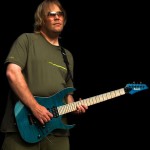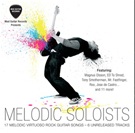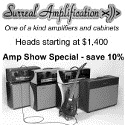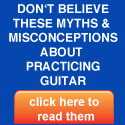Magnus Olsson’s Career Advice
 (extended answer taken from the Melodic Soloists interview)
(extended answer taken from the Melodic Soloists interview)
But before I start do I just want to say that it is good to have in mind that all this stuff is just opinions, there are no truth around to be found, and that if you ask 1000 players will you get 1000 different answers. What I write are just what I think, I don’t claim to have or know any truth.
It might sound obvious, but still so many people forget that their own opinion and believes are as valid as anyone’s opinions (or the opposite, they get really provoked by other peoples opinions).
Playing wise do I believe in the ”playing guitar really helps your guitar playing” way of thinking, that spending focused quality time with your instrument is what makes you a better player. There really are no short cuts to be found (I have at least never heard of anyone finding any). Hunting that last supermega exercise on internet won’t really help. I believe that your results are a lot more in how much you focused do those exercises than in what those exercises are (I not saying that type of exercise are of no importance, just that it isn’t so big as many people try to claim they are). The main reason, beside talent, that some players have a lot better technique than others are mainly that they spent more focused time with it, not necessarily that they had better exercises.
I think that the best way to evolve as a player is to work on that stuff that you feel that you need to be better at. Sort of like looking at yourself as if you where looking at someone ells playing and thinking “he really needs to work on this or that”.
The more specific you are with your”what I want/need to be better at” the easier it will be to come up with exercises to get better at it. Try to make (or find) exercises that work on your specific problem as focused as possible instead of just taking a bunch of random exercises that isn’t really aimed at being an exercise for anything specific. A cool lick is not always the same as a good exercises, but still try to make you exercises musical if possible (so you can use them in your playing).
Really listen to your playing all the time, note choice, technique, intonation, rhythm, and vibrato and so on. Try to not leave any crucial parts behind so all parts of your playing follow each other reasonably well. Record yourself often, and be brutally honest about what you hear. Get yourself a little home studio (preferably a non computerized one, so you don’t get lost in everything computer programs can do with new hip sounds that you just have to have every week) and make music, force yourself to record one new song every week (everyday or every month). Don’t use other peoples BT’s (unless that is your goal in life, playing over other peoples BT’s, I mean), always make your own instead. Then you learn all the other stuff besides just the soloing at the same time.
Pat yourself on the back when you do well, we all need the”I did good, I feel good” encourage to stay motivated to keep on going. Kick yourself when you don’t do well so you don’t want to do”not well” again.
Then work on all the things you want to kick yourself for when practicing and play all the things you pat yourself for when playing live or serious recording.
The goal is to get to pat yourself all the time, but I don’t think anyone beside Yngwie every gets to that level *LoL*
I also think that is a good idea to ask yourself what it is that you want to do and where you want it to go, sort of why you are spending all your time with that guitar in your knee. When you figured that one out, then set realistic short and long time goals for yourself and make sure you do everything in you power to achieve them.
I think that visualizing goals and visualizing the way to get there are extremely important. I mean goals playing wise, not career wise (even if they often go hand in hand, your career choice can for sure affect what you need to be able to do playing wise).
I personally think that the best advice any player could get is to stay away from TABS (unless you write them yourself) and learn everything you want to learn by figuring it out by ear. You’re most powerful and useful tool as a player and musician are your ears.
All the other stuff doesn’t really mean anything and won’t help you with anything if you lack your ears. You can learn to get great technique and to play the right scale over the right chord at the right time, but you will never really be able to get that music in your head out on your instrument (writing music or improvise solos) without your ears.
Use tab to correct yourself if needed, or use it to learn new scales or theoretical ides, but try to learn other peoples stuff by using your ears.
It will take a long time in the beginning, but it will go fast and faster and end up being a lot faster than reading tab will ever be. And when your ears are really good, then you will start to notice that the tab was almost never right anyway.
And the most important thing, I keep that short so you actually what to read it *LoL*
Don’t forget about working on your tone shaping, intonation and vibrato too.
Career wise?
I don’t know, no one does, the music business is all upside down right now and no one really knows how it will look in the future. There really are no good advices for anyone to give since everything is constantly changing. Something that worked and was valid a year ago is totally dated now.
To cut it short, I think that musicians (including all of us, but especially people playing non commercial music like we do) need to find other ways than record sale to make money and make a career. We need to find new ways of offer more than just music so people are willing to pay for the experience (and it needs to be something you can’t download). Examples of things that people are doing already are artist selling meet and greet passes at concerts (Vai’s EVO pack, for example), selling lessons while touring, doing guitar lesson camps (IA’s Freak Guitar Camp, for example), offering ”extras” with cd’s (posters, autographs, limited boxes and so on) ect.
I basically think that we need to be a lot more business oriented in our thinking, better at selling ourselves than ever before, being a goos musician won’t be enough anymore. We need to more like entrepreneurs than musicians (or better yet, a good mix of both) and try our best to find new ways of getting people to want to pay for the experience we offer.
To sum it up, I really believe that doing it because we love music and playing and not because we want to go somewhere with it career wise is the way to go to keep ourselves happy in the long run. I don’t mean we shouldn’t want a career or that we shouldn’t work for it, I just mean to try to make the journey as enjoyable as possible by doing things we love. Then we’re happy and have enjoyed the ride even if the end of the trip turns out less good than we expected (read as, so you enjoyed yourself even if you didn’t make it anywhere with your playing).
Getting a career as a hired and/or session’s player is a bit different than getting a career as a solo (or in a band) recording artist. The session part of the business has change too, less albums with a “hire session guy’s budget” are being made and more artist can get away with doing sing-back live gigs (no band, just a backing track) on tour.
But there is still plenty of work out there if you look for it.
If you want to go that way (or maybe go both ways), then you might want to add a couple of things to your practice routine, stuff that could be useful.
* Learn to sing backup harmonies; it is almost a must these days, you basically need to be able to sing. There are thousands of guys that can do the guitar parts, so you need be able to offer more to stand out.
* Try to learn to play other instruments beside electric guitar, acoustic steel and nylon string, slide, banjo, mandolin, pedal steel, lap steel and so on. The more you know the bigger chance you have to be the one getting the job. Again, there are so many guys out there that can do the guitar parts so having that skill only just isn’t enough.
* Practice to learn new songs fast, to pick things up fast and to remember it fast (it is mostly down to your ears).
* Practice to play easy and melodic stuff, play well ”in the style of”, and play safe so you can do something that works without mistakes the first take.
* Practice to always play well in time and well intonated.
* Practice to get a good and steady tone (both gear wise and ”in your fingers”) for most styles and a basic understanding of most styles. So if you get asked to play a reggae (for example) song can you dial in a tone and a playing style that fits the music.
We have a name for it in Swedish called ”stilkänsla” (style feeling) but I don’t know what it’s called in English.
Being and easy going person, being simple to get along with and having the ability to get the person who hires you to feel good (most of the time a singer, and they are complicated people *LoL*) are extremely important, so work on your social skills too.
For me does it all come down too, do what you love and what you feel is right.
Stick to your guns unless they turn out to be utterly stupid *LoL*.










